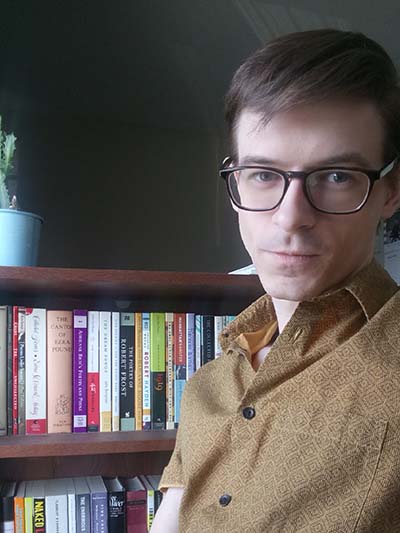 If you were to drop in unannounced at Tim Clarke’s place you might find him playing his guitar to relax, but more likely, these days, you’ll find him preparing for his new role as Assistant Professor in the Foundation Year Program (FYP). That means reading and reading and reading.
If you were to drop in unannounced at Tim Clarke’s place you might find him playing his guitar to relax, but more likely, these days, you’ll find him preparing for his new role as Assistant Professor in the Foundation Year Program (FYP). That means reading and reading and reading.
“For the last three or four months I’ve been reading material from the most recent FYP reading list that I haven’t gotten to before,” he says. “Take Dante for instance. I had read Inferno but I hadn’t read Purgatorio or Paradiso. I’m not just reading particular texts but also reading around them, trying to get a sense of what these different historical periods were actually like, what the intellectual landscape looked like and how they were consuming and engaging with texts from earlier periods. That part of my process has me pacing around a lot and talking to myself out loud.”
With a grin Clarke adds, “It’s not a graceful process.”
Clarke is coming to King’s from the University of Ottawa where he earned his PhD. His scholarly interest is in literary modernism. FYP is not so finely focused, which fits Clarke just fine. He is looking forward to leading the tutorials.
“I like being in a place where I’m uncomfortable and I’m forced to talk—forced into the position of discussing material that isn’t my main focus, the focus of my research. In a sense I’m coming to it level with the students. Of course I have the experience of being an academic, but I’ll be dealing with texts I have never written about. It’s just me, the book and the students. There is something vital about being in that position alongside them.”
Thinking of that and what it will be like at King’s reminds Clarke of where he earned his BA—the Grenfell Campus of Memorial University in western Newfoundland.
“There were small classes where you knew everyone’s name. I don’t think anyone learns alone. You need to step into a community to learn. And I had professors who made the texts seem like they were connected to a bigger world. They weren’t just dead words written in the past, they were still alive.”
That’s what he wants to bring to FYP. But Clarke also wants to bring a perspective of diversity.
“I think a lot about the narratives of civilizational progress. They are important to consider, particularly in a program like FYP, which is often thought of as an investigation or interrogation of the west, or the western tradition, or western civilization. I approach those narratives with a certain ambivalence. I’m a member of the Qalipu Mi’kmaq First Nation, so I try to be very conscious that the narrative of ‘progress’ has often led to a lot of violence against people like my ancestors and countless others in the so-called Americas.”
The Qalipu First Nation Band was established just a decade ago and is made up of 67 traditional Mi’kmaq communities. As it grows and develops so too does Clarke’s connection to his heritage.
“The history of Mi’kmaq people was denied in Newfoundland for a long time, and like many, I didn’t grow up immersed in the culture. So one of the projects of my adult life has been reconnecting to that.”
In doing so Clarke will enhance the lesson of critical thinking so necessary for FYP students.
“It informs the way I approach the idea of western civilization. For instance, if we are talking about the philosopher John Locke and his theory of property, we can point out that this theory has been in any number of direct or indirect ways involved in the dispossession of Indigenous peoples throughout the world. Part of what FYP can bring to interrogating notions of civilizational progress is a critical eye, a self-reflexivity, a self-consciousness. It’s not about investigating the uninterrupted course of progress. I think cultural awareness and reconnection subtly influences how I see things and how I articulate myself in the classroom. I’m still working that out for myself.”
It is a fascinating journey that Clarke is on.
“I try as much as possible to benefit from the generosity of our people throughout Mi’kma’ki. There are many knowledge keepers who share what they know with those of us looking to reconnect. There is also a language learning initiative organized by the band that I’ve been participating in.”
A fascinating journey indeed, and for Clarke an important one.
“They are small steps but small steps to something larger.”

